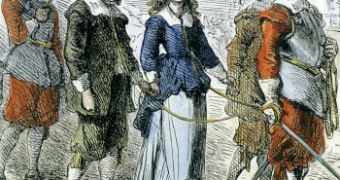Quakers or the Religious Society of Friends appeared during the 17th century in England, a society created by George Fox (1624-1691), the son of a weaver from Leicestershire. Fox pretended to have heard a miraculous voice and thought he could communicate directly with God, receiving wisdom directly, without a human intermediary. The society was founded in 1652.
They were called quakers because before receiving the divine revelations, they started to quake. Their goal was to find the religious truth and to revive early Christianity.
For guidance, they relied on the Holly Spirit, biblical prophets and the inner "light" or "voice" of the supposed spiritual truth. During their meetings, they kept silence periods when each one was looking for God's guidance. If somebody received divine message, he/she could say it. Today, their services are more organized, being performed by a paid pastor.
Quakers believed in truth, in absolute honesty, a simple way of life and non-violence. They thought all Christians, including women, should attend. Because they rejected traditional religion, avoided fasting and pretended to be guided by an inner voice, not by a clerical class, they caused fear and suspicions. The most annoying was their missionary ardor that enraged, rebelled the masses and that is why the authorities had to often intervene.
In England they were imprisoned and in New England (later northeastern US), they were banned and killed. Quaker missionaries were hung, chained, branded, ear cut or wiped in Boston during the 17th century. Quakers' books were publicly burned and people speaking with quakers were amended with 5 pounds; quaker women were disrobed and suspected of witchery. Still, the quakers' number was growing and in 1681, William Penn (1644-1718), a converted young English quaker, founded a colony based on the quakers' ideals and administered by them, a "holly" experiment of governing. The British crown offered Penn a large territory in North America to Penn as a payment for the debt to his father, a British admiral. In the new colony, religious freedom was absolute and the land was called Pennsylvania ("The forest of Penn").
In 1682, he made a pact with the Native Americans of the area and founded the city of Philadelphia ("Brotherly love"). In England, Penn encouraged people to immigrate to his colony, from traders to poor people and idealists. Many people from England and northern Ireland arrived for a life devoid of social and political issues. Mennonites from the Rhine areas and others religious groups from Europe arrived.
But later, most of the colonists were non-quakers and maintaining the pacifist principles proved to be difficult. This was turned even more difficult by the British-French war in North America (which challenged the quakers' principles) while the new non-quakers colonists started to take by force land from Native Americans. Quakers turned into a minority in Pennsylvania and the relationship with the Indians turned increasingly tensioned.
The worst event happened in 1756, when the governor and his council declared war on Delaware and Shawnee Indians. Quakers were no longer part of the government and their experiment lasted just 75 years. Today quakers are divided into many sects.

 14 DAY TRIAL //
14 DAY TRIAL //